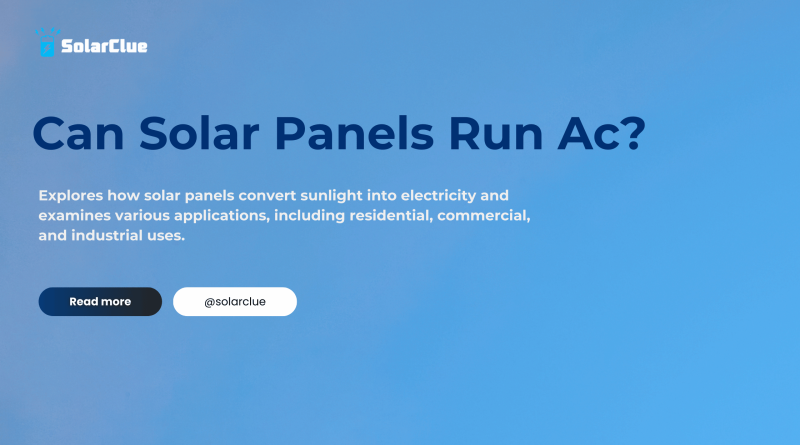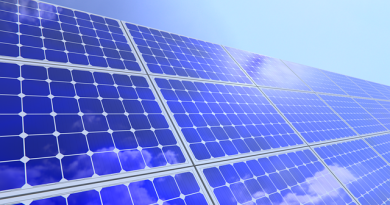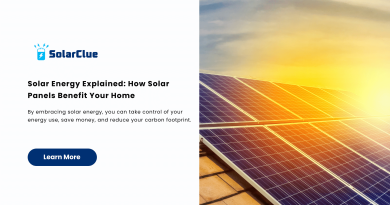Can Solar Panels Run Ac?
Air conditioners (AC) are essential for comfort in hot climates, but they can significantly increase electricity bills. Powering your AC with solar energy is a sustainable and cost-effective solution. This guide explores the feasibility of running an AC solely on solar power, including system size, battery storage, and geographic location. We’ll also cover can solar panels run ac and net metering, installation tips, and address common concerns.
Table of Contents
- 1 Calculating Solar Panel and Battery Requirements for AC
- 1.1 Solar Panel Requirements
- 1.2 Understanding the Impact of Peak Energy Consumption
- 1.3 Maximizing Solar Energy Production During Peak Cooling Hours
- 1.4 Cost-Benefit Analysis of Solar AC Systems
- 1.5 Government Incentives and Rebates for Solar AC Installations
- 1.6 The Future of Solar-Powered Cooling Technology
- 1.7 FAQ Section
Calculating Solar Panel and Battery Requirements for AC
Solar Panel Requirements
1. Determine AC Power Consumption:
a. Check the AC unit’s power rating (usually in watts or kilowatts).
b. Example: A typical 1.5-ton AC unit consumes about 1.5 kW per hour.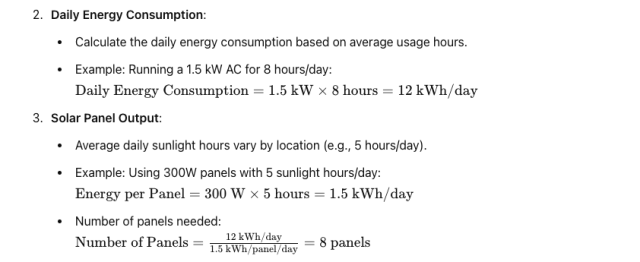
Battery Storage Requirements
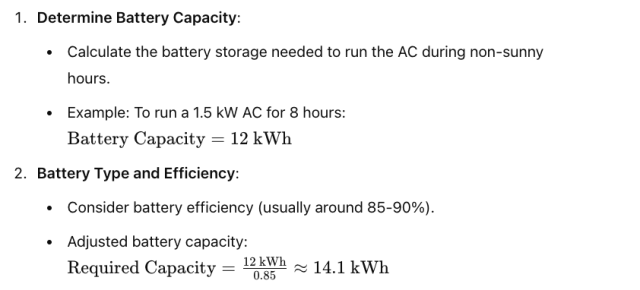
Understanding the Impact of Peak Energy Consumption
Peak Load Management:
- AC units often operate during peak sunlight hours, aligning with peak solar production.
- Use energy-efficient AC models and smart thermostats to manage consumption.
Maximizing Solar Energy Production During Peak Cooling Hours
1. Optimal Panel Placement:
- Install panels facing true south (in the northern hemisphere) at the optimal tilt angle.
- Ensure panels are free from shading.
2. Tracking Systems:
- Consider solar trackers that adjust panel orientation to follow the sun, increasing efficiency by 20-30%.
3. Energy Storage and Management:
- Use high-capacity batteries to store excess energy produced during peak sunlight.
- Implement smart energy management systems to optimize usage.
Cost-Benefit Analysis of Solar AC Systems
Initial Investment
1. Solar Panels: Cost depends on panel efficiency and number of panels needed.
2. Inverter: Necessary to convert DC to AC power.
3. Batteries: High-capacity batteries can be expensive but are essential for non-sunny hours.
Long-Term Savings
1. Electricity Bills: Significant reduction in electricity costs over time.
2. Maintenance: Minimal maintenance required for solar panels and systems.
Government Incentives and Rebates for Solar AC Installations
1. India: Subsidies and incentives are available through the Ministry of New and Renewable Energy (MNRE) and state-specific programs.
2. USA: Federal Investment Tax Credit (ITC) offers a 26% credit on solar system costs.
3. Other Countries: Check local government programs and incentives.
The Future of Solar-Powered Cooling Technology
1. Innovations: Development of more efficient solar cells, advanced battery storage, and integrated solar AC units.
2. Market Growth: Increasing adoption of solar-powered cooling in residential, commercial, and industrial sectors.
3. Sustainability: Solar cooling systems contribute to reduced carbon emissions and lower environmental impact.
Conclusion
Powering air conditioners with solar energy is a feasible and sustainable option that can lead to significant cost savings and environmental benefits. By calculating the right system size, optimizing panel placement, and leveraging government incentives, homeowners and businesses can effectively transition to solar-powered cooling.
Here at SolarClue®, we offer a smart, practical, and “beautiful” solution. You will be answered for all the questions related to Solar.
We provide all kinds of brands that are the Best Solar panels in India.
If you are the one who is planning for the solar power system. Don’t hesitate to contact our team!
Looking forward to empowering you with solar energy, just like hundreds of our other clients!
FAQ Section
1. Can I run my AC solely on solar power?
Yes, with the right system size and battery storage, it’s possible to run your AC solely on solar power.
2. How many solar panels do I need for my AC?
It depends on your AC’s power consumption and daily usage. Typically, around 8-10 panels are needed for a 1.5 kW AC unit.
3. Is battery storage necessary for a solar AC system?
Yes, batteries store excess energy for use during non-sunny hours, ensuring consistent AC operation.
4. What are the benefits of using solar power for cooling?
Benefits include reduced electricity bills, environmental impact, and increased energy independence.
5. Are there government incentives for solar AC installations?
Yes, many governments offer incentives and rebates to promote solar energy adoption.

